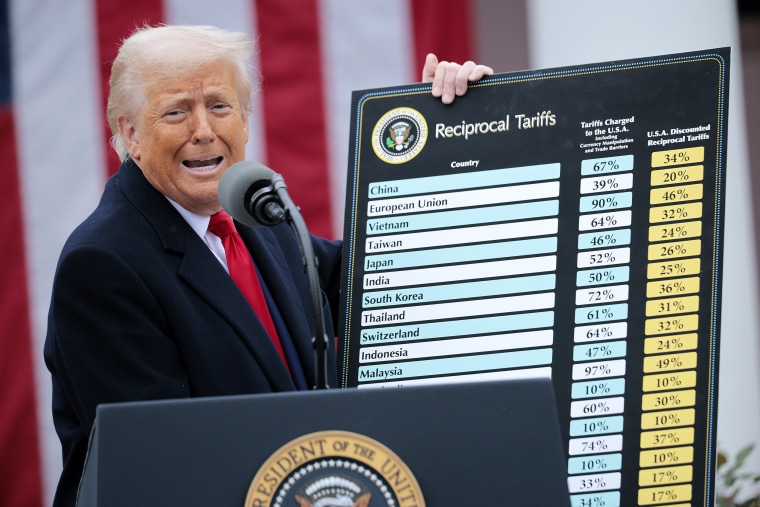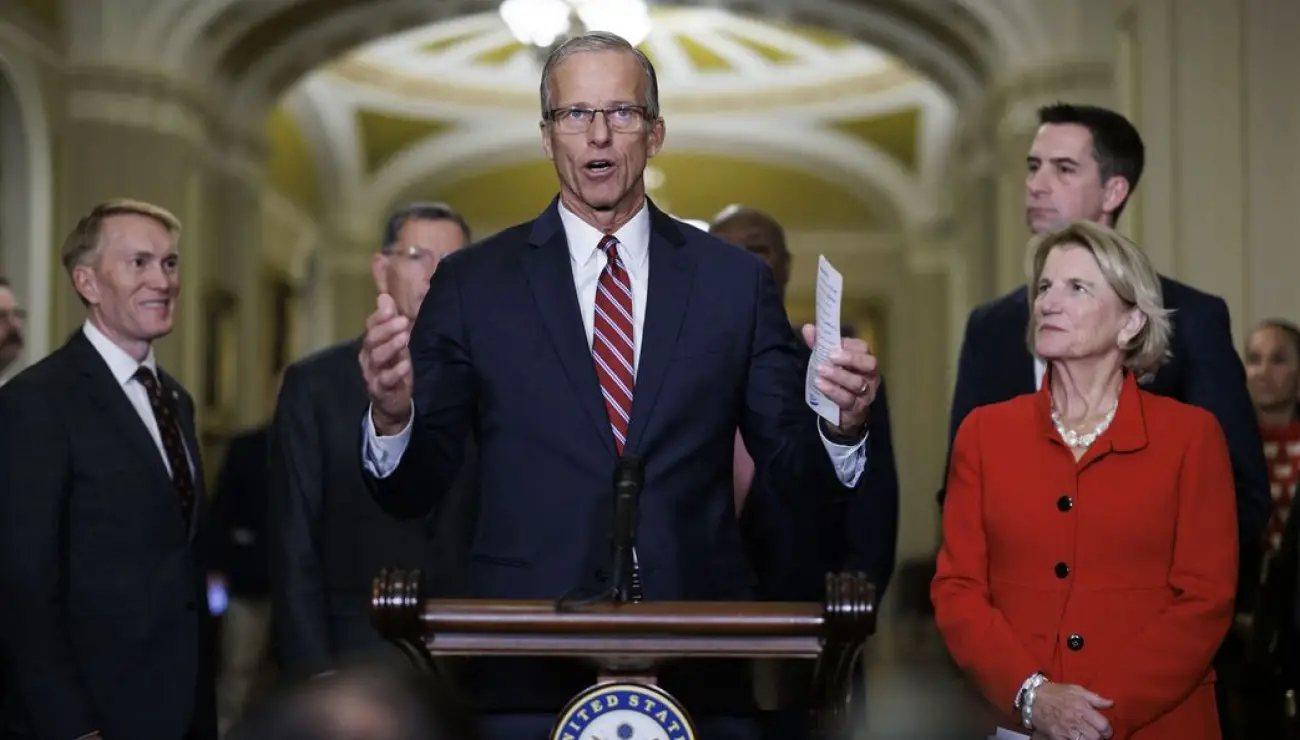The unfolding saga of President Donald Trump’s new tariff regimen has prompted a backlash from some Republican senators, signaling a growing rift within the party on trade policy. As Trump marks his “Liberation Day,” heralding a bold and ambitious strategy to reshape America’s trade relationships, several GOP senators are voicing their concerns. The tariff policies, enacted without much room for a trial period or the careful analysis of potential consequences, have some lawmakers worried about the economic fallout. While Trump has framed this as a necessary step toward revitalizing American manufacturing and addressing longstanding trade imbalances, many in the Senate are questioning the wisdom of such rapid changes.
A Bold New Approach to Trade Policy
On April 2, 2025, President Trump delivered a speech that would go down in history. He proclaimed that this date would forever be remembered as the day American industry was “reborn” and the day America’s “destiny was reclaimed.” Trump’s vision for reclaiming America’s economic strength was simple: enforce reciprocal tariffs on countries with unfair trade practices, using them as leverage to level the playing field for U.S. manufacturers.
This aggressive tariff regime stems from the investigations Trump ordered earlier in his administration to assess the root causes of America’s persistent trade deficits. These deficits have long been a point of contention, with Trump and his allies arguing that the trade imbalance has contributed to the erosion of U.S. manufacturing jobs and national security vulnerabilities.

Trump holds up a chart at the White House on Wednesday. Chip Somodevilla / Getty Images
Trump’s executive order outlines that America’s chronic trade deficits in goods—primarily with key trading partners—have led to what he described as the “hollowing out” of American manufacturing. The order also blames foreign tariffs, non-tariff barriers, and economic policies in other countries for suppressing wages and consumption in the U.S. while artificially boosting the competitiveness of foreign goods. Trump’s push for reciprocal tariffs is intended to counteract these economic practices, thus addressing what his administration sees as a national emergency.
Trump’s rhetoric echoes his “America First” policy, a central theme of his 2020 election campaign. He strongly believes that such tariffs will help America regain its manufacturing prowess, which has seen a sharp decline over the decades. As of 2023, U.S. manufacturing constituted just 17.4 percent of the global total, a dramatic fall from 28.4 percent in 2001. Trump aims to reverse this trend and bring more manufacturing jobs back to American soil, reinvigorating sectors critical to national security and economic growth.
However, despite the administration’s high aspirations, the decision to implement such significant trade changes has raised questions about the short-term consequences for American consumers, businesses, and workers, particularly those in the agricultural sector.
Republican Senators Push Back: A Divided GOP Response
While President Trump is bullish on his trade policy, the tariff regimen’s rollout has been met with skepticism from some within his own party. A few key Republican senators have voiced concerns about the potentially severe short-term economic consequences of these tariffs, highlighting a growing division within the GOP over trade policy.
Senator John Kennedy (R-La.), known for his blunt and colorful remarks, did not mince words when discussing the potential fallout from Trump’s aggressive tariff strategy. Speaking to CNN’s Manu Raju, Kennedy delivered a stark warning about the economic impact: “In the long run, we’re all dead.” He continued by expressing his uncertainty about the short-term effects, adding that “nobody knows what the impact of these tariffs is going to be on the economy.”
Kennedy’s remark encapsulated the unease felt by some Republicans, especially those representing agricultural states. Many of them, including Senator Thom Tillis (R-N.C.), have voiced concerns about the immediate effects on American farmers. Tillis, while acknowledging the potential for long-term benefits, pointed to the more immediate struggles faced by farmers who are already financially vulnerable. “Anyone who says there may be a little bit of pain before we get things right, they didn’t talk about farmers who are one crop away from bankruptcy,” Tillis warned, emphasizing that these agricultural communities could bear the brunt of the tariff impacts.
Senator Kennedy went further during an appearance on Newsmax TV, saying, “We’re in uncharted waters and we don’t know. And anybody who tries to tell you that they know what the short-term impact is going to be is just lying. Either that or they’re selling deep stupid.” This blunt assessment reflects a broader sense of caution among some in the GOP, who fear that these tariff measures could backfire in the short run.
Despite these concerns, President Trump remains adamant about the need for strong action on trade imbalances, convinced that such bold steps are necessary to reverse decades of trade policies that he argues have disadvantaged American workers and industries.
Pelosi’s Opposition and the Growing Controversy
The introduction of reciprocal tariffs and the sweeping changes to U.S. trade policy came with its fair share of controversy. Leading Democrats, such as Speaker Nancy Pelosi, were quick to criticize the administration’s unilateral approach. Pelosi, in particular, was outspoken about the potential dangers of rushing into such an extensive trade policy overhaul without sufficient deliberation.
During a series of interviews, Pelosi raised concerns that the move could alienate American allies and disrupt critical trade relationships that had taken years to build. Her criticisms centered around the lack of consultation with key allies, as well as the failure to engage in broader international negotiations before imposing such tariffs. “This is not a matter of ‘America First’,” Pelosi argued, “it’s a matter of putting America in a position of economic isolation and retaliatory trade wars.”
Her comments reflected a broader anxiety within the Democratic Party and among some moderate Republicans that these tariffs could harm U.S. businesses and consumers more than they would benefit them. While Trump has insisted that reciprocal tariffs would eventually level the playing field for American workers, many are questioning whether the immediate consequences of such a policy could outweigh the long-term benefits.
The tension within the GOP over Trump’s tariffs has underscored the broader challenges faced by the party. Republicans have long prided themselves on advocating for free trade and minimal government interference in the economy. However, the Trump administration’s “America First” approach to trade has altered the conversation, forcing some Republicans to grapple with the implications of protectionist policies.
The Broader Economic Impact and Global Reactions
The ripple effects of Trump’s tariff regimen are likely to extend beyond U.S. borders, with international trade partners already preparing to respond. Countries that are directly affected by the new tariffs may retaliate by imposing their own levies on U.S. exports, a move that could lead to a series of escalating trade conflicts.
The European Union, China, and other major trading partners have already signaled their concerns over the new tariff structure, with some threatening countermeasures. Such trade wars, while possibly beneficial for some U.S. industries in the short run, could ultimately lead to higher prices for American consumers, reduced global competitiveness, and strained diplomatic relationships.
For American businesses, particularly those in the agriculture, technology, and manufacturing sectors, the immediate effects of Trump’s tariffs are likely to be felt across supply chains and production costs. While U.S. manufacturers may stand to benefit from the tariffs, other industries that rely on imports may see rising costs, which could ultimately be passed on to consumers.
China, a major trading partner of the U.S., is expected to be one of the most affected by the tariffs. As the world’s second-largest economy, China has significant leverage over global markets, and any disruption in trade relations with the U.S. could have far-reaching implications. Experts predict that China’s response to Trump’s tariffs could come in the form of retaliatory measures aimed at key American industries.
Conclusion: The Road Ahead for the U.S. Economy
President Trump’s bold approach to trade policy is being met with mixed reactions both at home and abroad. While some Republicans continue to support his efforts to rectify trade imbalances, others remain wary of the potential consequences of his tariff regimen. The tension within the GOP over these trade policies highlights the broader challenges of implementing protectionist measures in a globalized economy.
As Trump presses forward with his tariff agenda, the long-term impact on the U.S. economy remains uncertain. While his administration argues that these measures are necessary to restore American manufacturing and reduce trade deficits, critics warn that the immediate consequences could be severe, particularly for industries reliant on international trade.
For now, the political and economic landscape is in flux, with the fate of Trump’s tariffs likely to hinge on future negotiations with global trading partners, the response of Congress, and the results of ongoing assessments of the policy’s effectiveness. As the global economic climate continues to evolve, the effects of these tariffs will likely play a central role in shaping the future of U.S. trade policy and its standing on the world stage.
In the end, the full scope of Trump’s trade agenda will only become clear in the years to come, as the U.S. seeks to recalibrate its economic relationships and trade practices in an ever-changing global environment.

